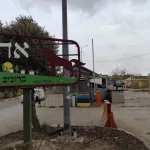Israel to Establish ‘Land Ports’ to Reduce Cost of Living
Israel to establish innovative land ports to reduce cost of living, improve logistics, and reduce environmental impacts. Inland ports set to revolutionize cargo
Jerusalem, 14 August, 2025 (TPS-IL) — Israel’s Ministry of Transportation and Road Safety is promoting a national project to establish land ports, something it called an “innovative concept of advanced logistics centers” that will serve as a “natural continuation of seaports, and will enable rapid transportation of goods by train and their storage in a land area far from the coast.”
The model, which operates in the world’s most advanced ports, involves unloading cargo directly from a ship to the port, and from there to a train that will transport it to the inland port, where all customs clearance procedures and approval by authorized bodies (health, economy, etc.) will be carried out. This will make it possible to free up valuable space in seaports, increase port capacity, improve logistical efficiency, and reduce environmental impacts.
Today, 99% of goods arriving in Israel arrive by sea, and over 90% of them are transported by truck. Transporting cargo by road causes traffic congestion, road accidents, air pollution, infrastructure erosion, and heavy expenses for the economy. The inland ports are expected to dramatically reduce the number of trucks entering and leaving the ports, increase the use of the train, and bring goods closer to importers and exporters, while saving time and costs.























